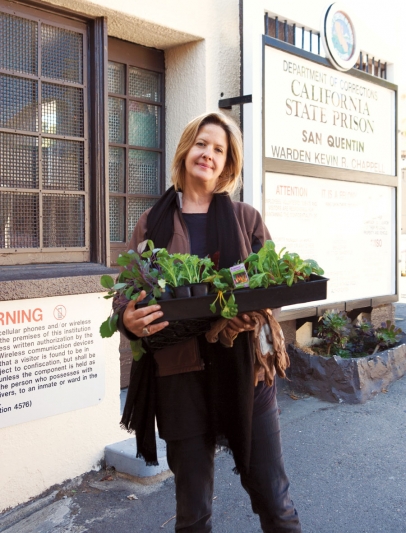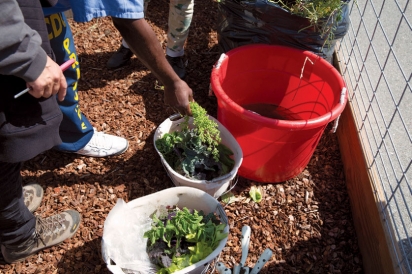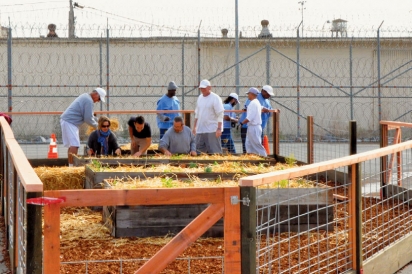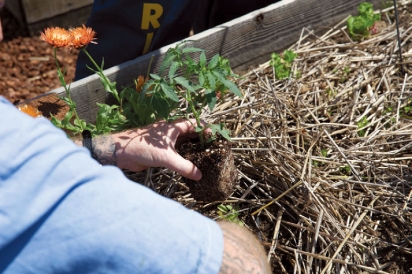Insight Garden Program: The Prison Gardener Offers San Quentin Participants a New Leaf
For Beth Waitkus, nature as nurture started early. As a towheaded toddler in New Jersey she helped her maternal grandmother with Dutch roots plant dozens of tulip bulbs. She spent many childhood days combing the foothills of the Berkshires in Connecticut, playing in the woods. The great outdoors offered an endless refuge from the stresses of everyday life.
Waitkus, a one-time Marin resident, has been both a political activist and an organizational management consultant. Her experiences in nature, whether hiking in Muir Woods or tending to her home garden, have continued to ground her in adulthood.
When she had a crisis of faith in humanity following the 9/11 attacks she sought solace at Spirit Rock Meditation Center in Woodacre. As part of a process in shifting her priorities and better understanding human nature, she took a tour of the medium-security San Quentin State Prison. There she met the founder and director of the Insight Prison Project, which provides meditation, yoga and restorative justice classes for prisoners.
While making rounds at the facility she was stunned by the barren, gray and lifeless environment, utterly devoid of greenery. It was a turning point for Waitkus.
In 2002, she launched the all-volunteer Insight Garden Program. Waitkus set about developing a curriculum for prisoners and redesigning the yard with those who signed up for her class. It took 18 months of planning and bureaucratic maneuvering, but then in four days during the 2003 winter solstice the prisoners built a garden bed in the corner of the yard.
Fast forward 12 years and the 1,200-square-foot organic flower garden is a vibrant, thriving plot full of mature, drought-resistant plants, healing herbs and ornamental grasses, including wild geranium, yarrow and echinacea.
It’s a welcome counterpoint to the razor wire, heavy chain-link fences and guard towers that loom over the military barracks-like buildings housing men in blue who have committed crimes and have earned a rep as a tough crew.
It’s also more than an aesthetic improvement. Waitkus says it’s her mission to help these incarcerated men reconnect to themselves, their communities and nature by nurturing the soil, seedlings and their own inner lives. At weekly Friday afternoon classes, guest speakers talk with prisoners about ecosystems, landscaping, permaculture, green jobs training and healthy food.
There’s also meditation, guided imagery and even an eco-therapist who comes by once a month to counsel these prisoners.
Many of the men in the medium-security unit have had little or no experience in nature or working the land. Over the years Waitkus has observed prisoners tending plants, petting bees and even naming their favorite bugs.
“Our core mission is to shift behavior from reaction to response and to grow people from the inside out, and we do that through organic gardening,” says Waitkus. “When people interact with soil, insects and plants you see a curiosity and wonder where there was never any.”
Around the same time she launched the garden program, Waitkus started graduate school, studying organizational development at Pepperdine University’s Graziadio School of Business and Management. Waitkus’ master’s thesis focused on the impact of the garden on the social climate and physical environment of the yard. Prisons are notoriously racially segregated institutions. The garden, she learned, was the only place at San Quentin where different ethnic groups mixed with ease and without fear of retribution.
In nature, Waitkus notes, diversity and cooperation are prized. The class of 25 to 30 mostly African American men reflects the demographics of the greater prison population, but the garden welcomes all comers. To date, 1,000 men have been through the program, spending anywhere from six months to two years among the plants.
Violence has never been an issue, even though garden program staff and volunteers work alongside prisoners without officers in attendance. Waitkus says she’s more concerned a prisoner might hurt himself with a tool than use it as a weapon.
She’s not naive: She’s a woman from the outside in an all-male prison. The 53-year-old is clear, she says, about boundaries. The hardest thing for her: the no physical contact rule. “I’m a hugger,” she says matter-of-factly. If anything, Waitkus adds, the men in her program watch out for her. When an officer once chastised Waitkus for planting a rose bush in the wrong place, her garden guys came to her defense.
Waitkus is quick to note that over the years the wardens, officers and other prison staff have been completely supportive of the program. Some officers who are avid gardeners themselves even come to her for garden tips, and many keep tabs on the progress of the plants, she says.
The Insight Garden Program has undergone its own growth in the past year. It successfully applied for nonprofit status in 2014 and received a gift of $200,000 a year for the next two years from an anonymous benefactor. The funds have been used to employ a small core staff, including director Waitkus whose “day job” up until April of this year was as an independent consultant for tech, government and philanthropic clients on organizational development, social marketing and strategic communications.
The new funding will also be used to refine curriculum and expand the model beyond San Quentin. The program is now also operating in Solano State Prison in Vacaville. Correctional facilities across the country are asking for advice and assistance in greening their own prisons and some have asked to partner.
Last year, the program finally got its longed-for vegetable plot. The edible garden at San Quentin came about in partnership with Oakland- based community gardening nonprofit Planting Justice, after five years of navigating through red tape.
“One of the officers here dubbed it our ‘Victory Garden’ and the name just stuck,” says Waitkus. Its first harvest last fall included onions, garlic, potatoes and leafy greens; the abundance went to the SF Marin Food Bank for community members in need. A correctional facility rule prevented the prisoners from benefiting directly from the bounty: Every prisoner must have equal access to resources within an institution. Since the garden doesn’t grow enough to feed all of the almost 4,000 prisoners at San Quentin, the harvest must find a home outside the prison gates. Waitkus turns this into a positive for the gardeners: It’s a way of giving back.
The produce beds also offer food for thought: Growing vibrant organic greens the prisoners can’t eat themselves offers a stark contrast to the prison grub that passes for nourishment, a reality not lost on the prisoners. Waitkus says correctional facilities are the quintessential food deserts. Still, her program helps educate prisoners about the importance of healthy eating and securing access to wholesome food when they’re paroled—including produce they can grow themselves.
The program is unusual in that it’s not strictly a vocation-oriented endeavor; it emphasizes the importance of transformation from within. As part of the curriculum for this gardening class behind bars, prisoners learn how to tend their “inner gardener” as well as their “outer gardener.” For Waitkus the individual is an ecosystem that needs care and feeding as much as flower beds or produce plots. Men are encouraged to control their “weeds” and manage their “pests,” apt metaphors given the program.
But it’s not all interior work. Practical, routine physical tasks include mulching, pruning, planting and weeding. Particpants learn valuable skills that can help them when they re-enter society. Several paroled men have gone on to landscaping, gardening and other green jobs. And Waitkus keeps tabs on how these ex-cons do when they get out.
As proof of the program’s success, Waitkus points to a 2011 recidivism count of 117 garden program participants who paroled between 2003 and 2009. It found that less than 10% returned to prison or jail. Nationally, six out of 10 prisoners wind up back behind bars.
“It tells us that we’re doing something right,” says Waitkus. “It’s both the hands-on experience outside and the behavior transformation we help facilitate in the prisoners.”
Waitkus says that the program helped restore her faith in humanity. She’s grown to realize that people who make poor choices have the capacity to change even under the most challenging circumstances. Sometimes all it takes is letting a man get his hands in soil and giving him the chance to care for plants to teach responsibility, empathy, cooperative behavior, perseverance and discipline.
Take men like Kevin Williams, a former prison participant now on the board of the Insight Garden Program who lives in Oakland, where he grew up. Williams earns a living wage working for Planting Justice as part of their Backyard Food Project, building affordable and accessible fruit and vegetable gardens, including in low-income and underserved sectors of the community. The men see the immediate benefit of their labor: providing beauty and a source of nourishment in neighborhoods in need.
Several former Insight Garden Program participants, including Williams, worked to construct the Canal Community Garden in San Rafael.
“We built over 100 raised beds there and people would just come out and give us the thumbs up. The support was wonderful,” says Williams, 43, who has spent 11 years behind bars, including, most recently, four years at San Quentin for assault. He spent three years in the garden program.
“I have nothing but love for Beth and Gavin [Raders of Planting Justice]. They took a chance on me when no one else would. I’m the living embodiment of what that program is about, a poster child for turning it around and getting it right. And it feels great.”
And he’s got company.
“I had a job to go to at Planting Justice when I came out; I’ve been able to totally transform my life because of the garden program,” says Anthony Forrest, 52, who did six years at San Quentin for assault and was paroled in 2011. For the past three years Forrest says he’s led a clean, green, peaceful life, building gardens for around 70 different customers. “When I connect with the soil I connect with myself and there’s a feeling of serenity. I’m watering the plants so they grow but I’m helping to grow myself, too.”
He is also a fan of the program’s founder: “Beth shows you how you can change and gives it to you slow enough that you can catch on and understand.” Prison chow is a distant memory now, too. “I’m growing my own kale and collards and I’m helping other people grow their own healthy food, too. It’s very satisfying.”
For Waitkus the motivation for supporting these men is simple. “What it comes down to is that people are in prison because they’ve done something wrong. But they’re still human beings,” she notes. “And most of them are going to come back to our communities, so we have to do something to address this and help these men transform their lives so they don’t recommit, which ultimately creates a safer society.”
Waitkus says everybody deserves a second chance. And her grassroots eff orts have harvested more than flowers, fruits and vegetables.
“Some people call what we’re doing rehabilitation. We prefer to call it healing.”
InsightGardenProgram.org
PlantingJustice.org
Sarah Henry’s local food stories have appeared in print in the San Francisco Chronicle, California and San Francisco and online at Modern Farmer, CHOW and Civil Eats. Henry is also a regular contributor to Edible East Bay and Edible San Francisco. Her last profile for Edible Marin and Wine Country featured advocate and cookbook author Bryant Terry. Find her in Best Food Writing 2014 and at SarahHenryWriter.com








